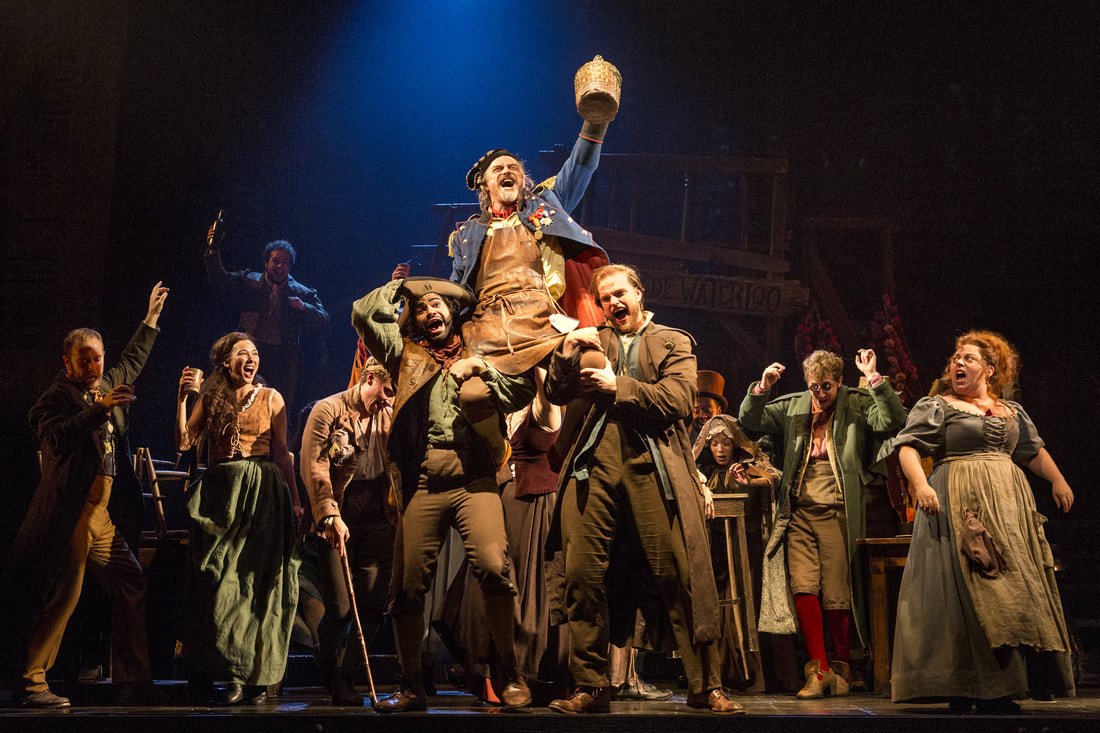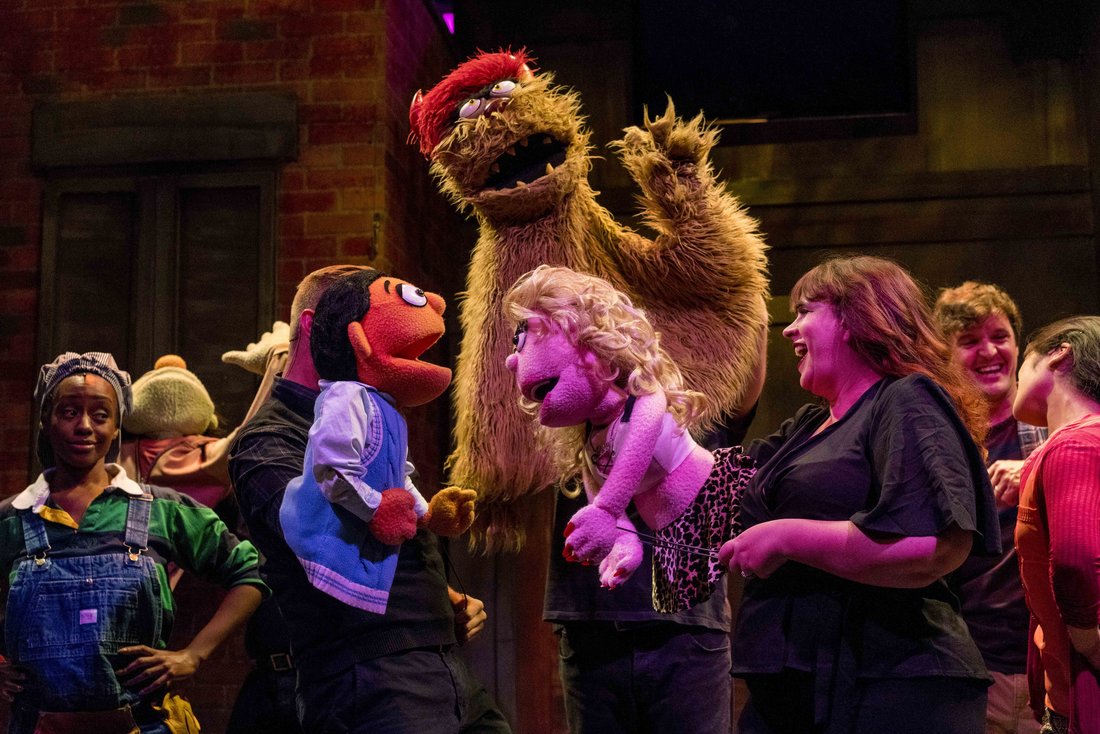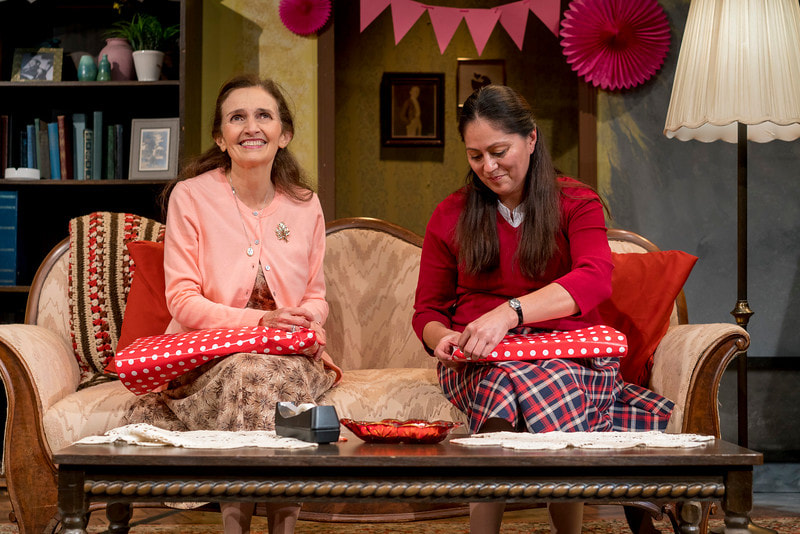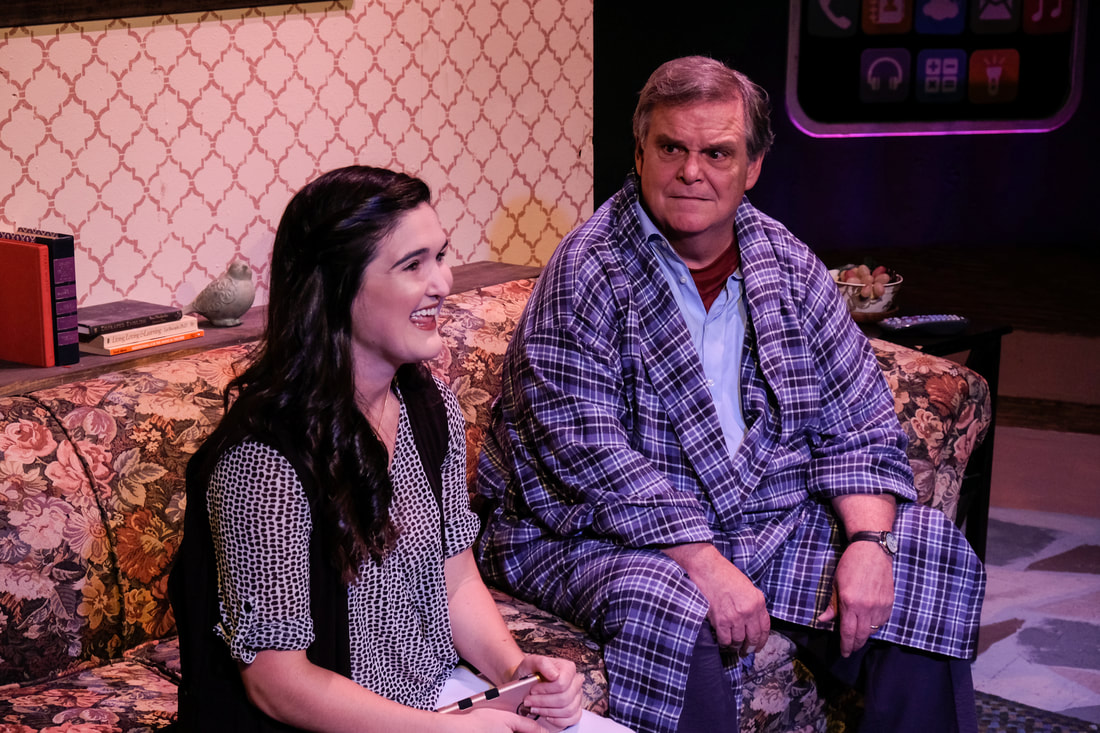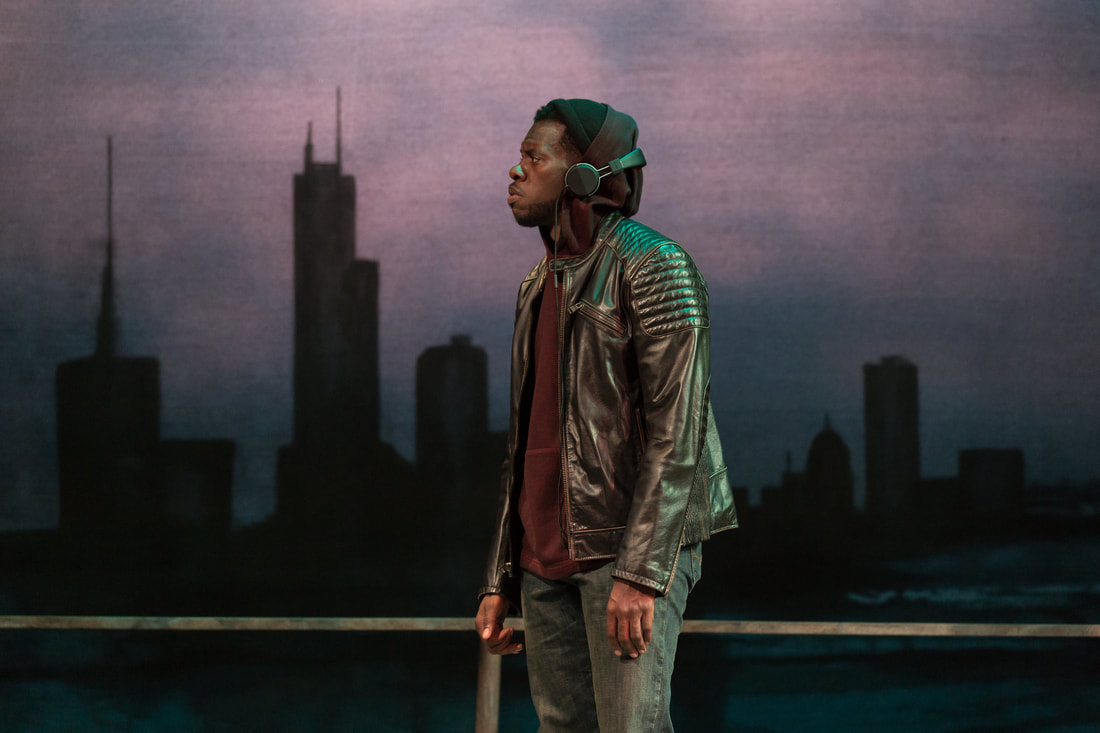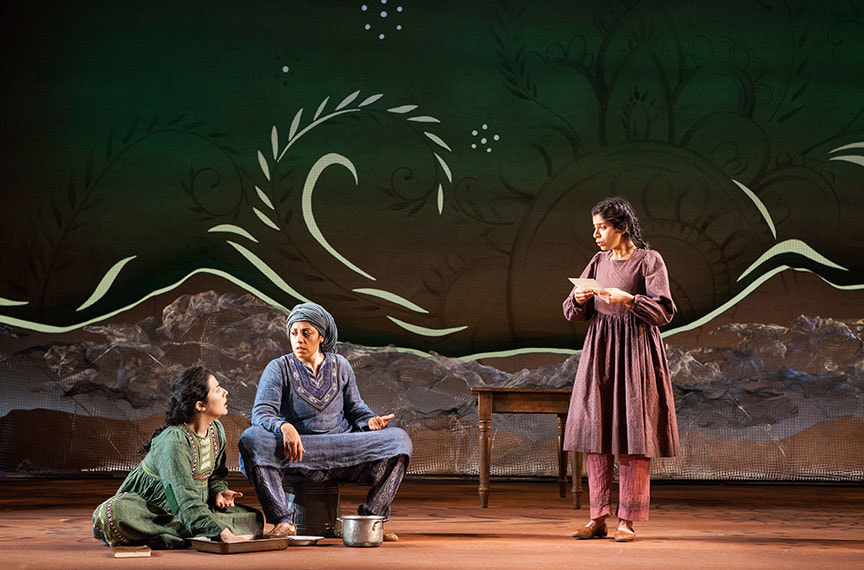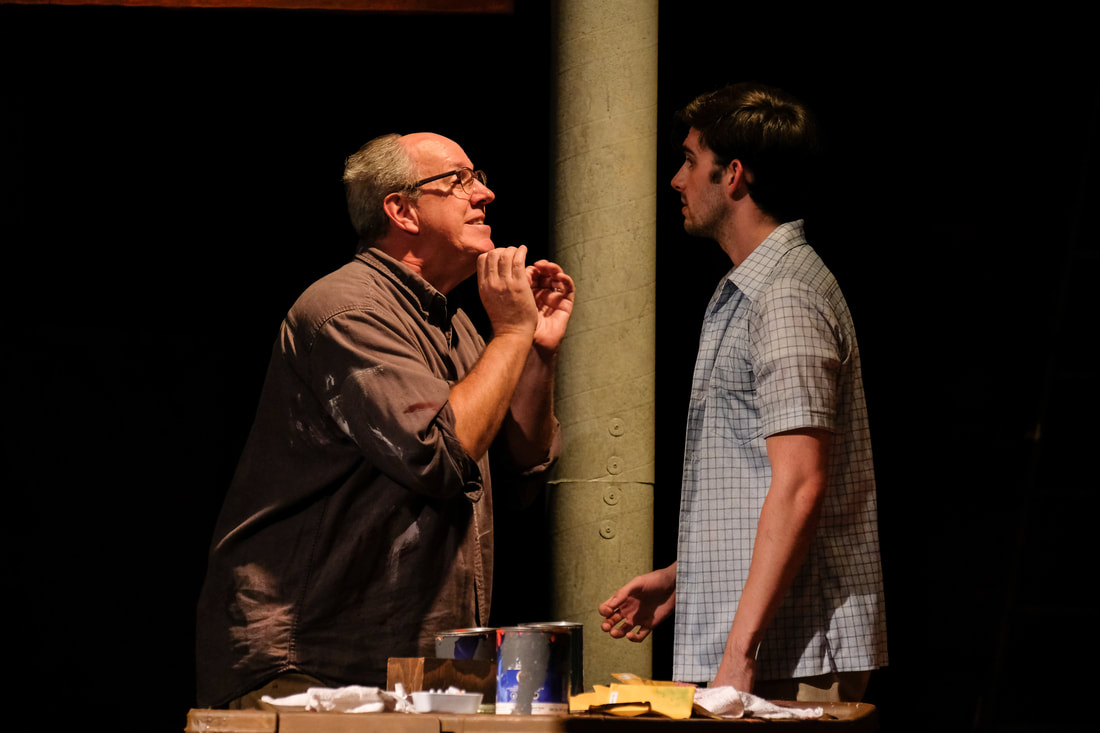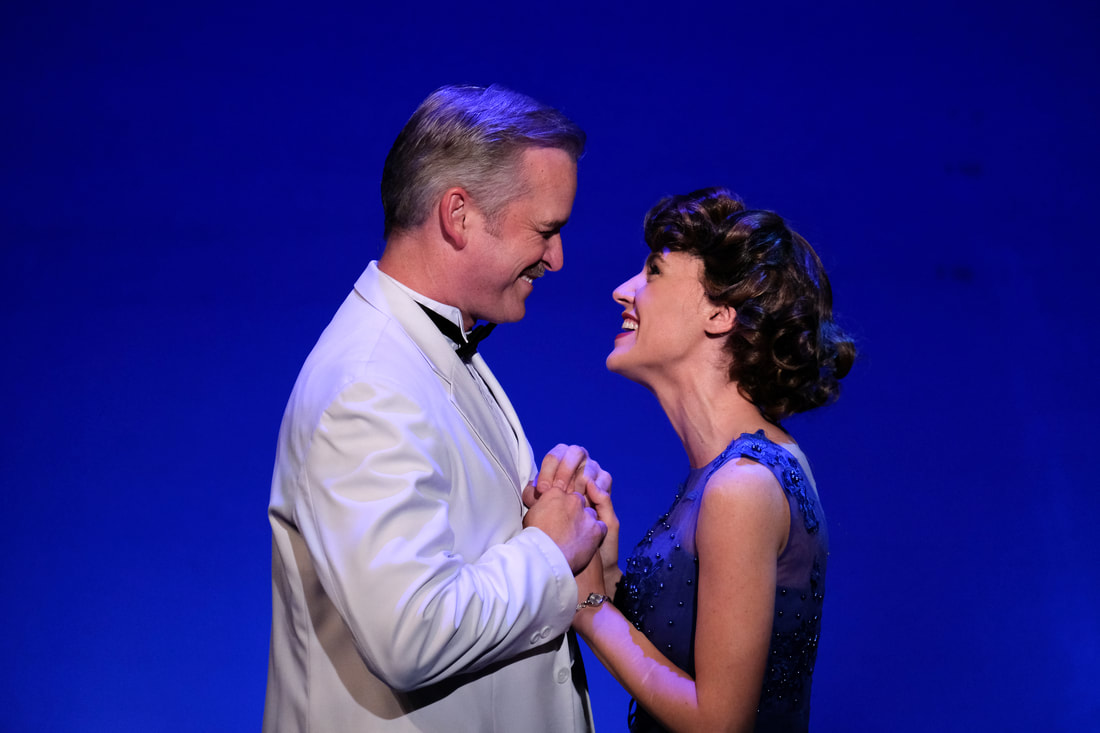|
"Les Miserables," aka "Les Miz," continues through Sunday, June 3. Photo by Matthew Murphy With its melding of history, spectacle, melodrama and romance, Les Miserables the musical has been such a hit for so long that it may be the only Broadway show popularly referred to by a nickname: Les Miz.
Any doubt about whether this rousing show based on Victor Hugo’s novel still has legs can be heard at the Civic Theatre downtown, where Broadway San Diego is presenting Alain Boublil and Claude-Michel Schonberg’s Les Miserables through Sunday, June 3. That sound you’ll hear is not only the emotional peaks and valleys of this formidable musical’s score, but the cheers from audience members seeing Les Miz for the third or fourth time, or more. An operatic, sung-through show that dispenses the tale’s weighty exposition in dribs and drabs, Les Miz nonetheless boasts its iconic tunes: “I Dreamed a Dream,” “On My Own,” “Bring Him Home” and, of course, “Master of the House.” This touring production enjoys a superb Jean Valjean, the saintly character whose saga began with the theft of a loaf of bread, in Steve Czarnecki. (He performed May 29 and 30 and returns June 3; Andrew Maughan assumes the role May 31 and June 1-2.) Czarnecki can sound sweet, despairing and plaintive all at once. Josh Davis bellows a bit as Jean Valjean’s antagonist, Inspector Javert, though he possesses all the ferocity the part requires. As is customary with BSD presentations, the sets are sumptuous and the special effects atmospheric. The acoustics in the old Civic aren’t the greatest but they’re far from miserable. Les Miz is a show that can’t help but triumph. Les Miserables continues through June 3
0 Comments
"Avenue Q The Musical" at New Village Arts in Carlsbad. Photo by Daren Scott Now 15 years old, Avenue Q The Musical and its naughty puppets don’t rock the same OMG factor that they once did, but this is still a very funny and audience-pleasing show. With a crackerjack band and a cast to match, New Village Arts’ production of Avenue Q manages to make the deconstructed puppet “behavior” seem fresh, even as its shock value has been exceeded by the likes of Robert Askins’ play Hand to God. An upcoming Melissa McCarthy film, “Happytime Murders,” is said to even further explode the sweet playfulness of the “Sesame Street” ethos.
But back to NVA’s Avenue Q. This staging directed by AJ Knox relies on the snarky charm of Jeff Marx’s and Robert Lopez’s original music and lyrics, and ace performances by Gerilyn Brault, Zackary Scot Wolfe, Melissa Fernandes and Cashae Monya, among others, ensures a rollicking evening. (Review originally published in San Diego CityBeat on 5/30/18.) Maria Gonzalez (left) and Sandra Ruiz in "The Madres." Photo by Daren Scott The simmering tension of The Madres takes awhile to boil, but when it does, Stephanie Alison Walker’s play overflows the theater with passion and anguish. Moxie Theatre is one of four U.S. companies rolling out the world premiere of Walker’s work based on the true story of the Mothers of the Plaza de Mayo in Argentina, courageous women under that nation’s dictatorship between 1976 and 1983 whose sons or daughters were kidnapped and even killed by the regime. Moxie’s production co-directed by Jennifer Eve Thorn and Maria Patrice Amon is profoundly affecting, in large part owing to the committed performances of Maria Gonzalez as Josefina and Sandra Ruiz as Carolina, a mother and daughter in search of Carolina’s own missing child.
The entire story unfolds in Josefina’s Buenos Aires apartment in 1979. Establishing the dangerous circumstances and contextualizing them in terms of Josefina and Carolina results in a slow-paced if suspenseful beginning to The Madres. The events that follow intermission, however, personify all the human drama that makes these women’s longing and agony so gripping. For a piece rooted in history, The Madres connects in contemporary terms to the plight of women today, in another country in the other America, mobilizing for justice. (Review originally published in San Diego CityBeat on 5/30/18.) Kay Marian McNellen and Fred Harlow in "For Better." Photo by Ken Jacques Mixed-up connections or loaded words spoken at untimely junctures result in romantic and domestic complications in For Better, playwright Eric Coble’s breezy comedy, which relies on the cell phone not only as principal prop but metaphor for what we say to each other – or don’t say. At Scripps Ranch Theatre under the direction of Eric Poppick, a cast of six has fun with the aforementioned complications, and but for an excess of sentimentality (mostly at the conclusion), audiences will too.
Central to the consequences of cell phone-itis is Karen Baedeker (Kay Marian McNellen), who’s become giddily engaged to a man she’s met in person only twice, the rest of the courtship having been via emails, texts and phone calls. While Karen’s old-fashioned dad Wally (Fred Harlow) – this is made clear by his penchant for watching “Columbo” reruns in his bathrobe – is accepting of Karen’s unorthodox arrangement, her older sister Francine (Heidi Bridges), a Type-A know-it-all, is not. What Francine doesn’t know, by way of subplot, is that her drab husband Michael (Charles Peters) has been sexting with the very sexy Lizzie Monohan (Erica Marie Weisz, this show’s sparkler). Then there’s globetrotting Stuart Tramontane (Kenny Bordieri), who turns frantic and turns to drink when he finds out, via cell phone naturally, that the Karen he has yearned for is getting hitched to someone else. Still with me? OK, the narrative is jam-packed. But it’s fun when everyone’s on stage at the same time, phones in hand, engaging in one or more digital conversations. That’s also when For Better is most energized and less like your run-of-the-mill rom-com. For Better continues through June 24. Terrell Donnell Sledge in "The Wind and the Breeze." Photo by Karli Cadel Photography From the top of a bridge in Rockford, Ill., onetime legendary hip-hop emcee Sam (aka Sam I Am) awaits Fourth of July fireworks -- months in advance of the big night. What the veteran rapper, disdainful of his past and resigned to the lack of a future, is really doing in Nathan Alan Davis’ The Wind and the Breeze is surveying the landscape that is his life, Meanwhile, a circle of young dreamers hungers for his support as they pursue their own musical destinies.
Directed at Cygnet Theatre by Rob Lutfy, The Wind and the Breeze is a promising new work from Davis, one rich with personal circumspection and enlivened by the rapping of Terrell Donnell Sledge as Sam and Demetrius Clayton as would-be protégé Shantell. Monique Gaffney, meanwhile, adds both edge and sensitivity as Sam’s knowing cop friend Ronda. To some degree, the play strains to demonstrate its gravity, and fireworks make for an easy metaphor. But The Wind and the Breeze has much worthwhile to say about fate, friendship and the search for the right place to touch down. (Review originally published in San Diego CityBeat on 11/23/18.) "A Thousand Splendid Suns" at the Old Globe Theatre. Photo by Jim Cox A production of immense emotional potency, the Old Globe’s A Thousand Splendid Suns, presented in association with American Conservatory Theater (ACT), is not to be missed. Adapted for the stage by Ursula Rani Sarma and based on the 2007 novel of the same name by Khaled Hosseini (“The Kite Runner”), the play explores the relationship between two Afghan women living in Kabul in the deadly years between 1979 and 2001. In spite of dehumanizing government restrictions and the unspeakable violence to which they are subjected by the husband they share, they strive with all their hearts for dignity, love and to hold family together.
Carey Perloff, ACT’s artistic director, oversees a fervent staging at the Globe that includes breathless performances by Nadine Malouf as young Laila and Denmo Ibrahim as the older Mariam. Haysam Kadri is unrelenting as the ruthless husband Rasheed. Original music directed and performed by David Coulter provides piquant backdrop to a story that is shocking in its depictions of brutality one moment and life affirming in the next. (Review originally published in San Diego CityBeat on 11/23/18.) Robert May (left) and Luke Monday in "Red." Photo by Ken Jacques Artistic temperament, thy name is Rothko. That’s Mark Rothko, the fiery abstract expressionist who is the alpha dog in John Logan’s brilliant Tony Award-winning play Red. Subject to all his pontifications, tantrums, insecurities and verbal abuse is a new young assistant named Ken, an aspiring artist who at the outset is eager to learn from a downright ornery and dismissive master with no intention of playing mentor. The tension of this relationship and what each man ultimately learns from the other coalesces in a cerebral but urgent 90 minutes.
Four years after Red was last seen locally, in a dynamic production at the San Diego Repertory Theatre, a worthy staging of its own is happening at the Brooks Theater in downtown Oceanside. Directing for the Oceanside Theatre Company is Kevin Hafso-Koppman. His actors are Robert May as Rothko and Luke Monday as Ken. Both are more than up to the challenge of Logan’s biting and articulate script. The action takes place in Rothko’s studio, circa 1950s, in New York’s Bowery, in a converted gymnasium where no natural light is admitted because the great artist can’t control such light. He soon discovers that he can’t control his assistant either, who challenges Rothko’s arrogance and pretentiousness with the simple question “Do you have to keep telling people what art is?” before really unloading on the egoist later (of course, to little avail). The quietly intense Monday credibly conveys Ken’s transformation. May’s Rothko is less unhinged than that of John Vickery in the San Diego Rep’s Red, but he’s just as domineering and dismissive, and besides, his character’s evolution is less transparent than Monday’s, as the play prescribes. At the Brooks Theater, Carol Naegele’s scenic design is suitably bohemian, and the artwork painting by Zachary Elliott is a shadowy blood red. The acoustics in the theater are problematic, however. The actors can be heard all right, but when Rothko’s phonograph isn’t playing one of his favorite classical pieces, a humming is audible beneath the exchanges between May and Monday. At least it was during a recent matinee performance. So rich with both cultural and psychological expression is Logan’s script that no unwarranted noise should intrude. (Review originally published in San Diego CityBeat on 5/16/18.) Its songs may seem old – because they are – but the longest-running Broadway musical revue ever is blessed with the endurance and exuberance of youth. The 39-tune celebration of composers Jerry Leiber and Mike Stoller is returning to New York in July for a much-anticipated engagement at Off Broadway’s Stage 42. That’s 23 years after it opened on the Great White Way and ran for more than 2,000 performances. But Smokey Joe’s Café is open for business locally right now, at OnStage Playhouse in Chula Vista where it’s directed and choreographed by Shirley Johnston, who is also a member of the nine-person cast.
Officially titled Smokey Joe’s Café – The Songs of Leiber and Stoller, this two-act show is a jukebox musical in the purest sense. It’s 100 percent sung through, with no spoken book, and its tunes are not strictly connected in any discernible thematic fashion. In the first act, for example, the comedic “Poison Ivy” is sandwiched between the torchy “Fools Fall in Love” and the vampy “Don Juan,” while in Act 2, “Jailhouse Rock” (complete with the ensemble in prison stripes) bisects the jazz-inflected “Some Cats Know” and the swooning “Spanish Harlem.” But continuity is less important than the Leiber-Stoller songs themselves, which over the course of two hours also include classics like “Kansas City,” “There Goes My Baby,” “On Broadway,” “Hound Dog,” “Young Blood,” “Yakety Yak,” “Love Potion #9” and the unifying finale “Stand By Me.” OnStage Playhouse’s cast is mostly young, but talented and sincere in their renderings, particularly Dominique Dates, Raymond Stradford III and the versatile, aforementioned Johnston. Her choreography is industrious and contributes added dimension to what otherwise would be an oldies concert. Consequently, the group numbers with parts of or the entire cast in dance mode are Smokey Joe’s Café’s high points. The solo vocalizations in general are overwrought. A six-member band, which includes 15-year-old Alvin Paige on saxophone, cranks out the tunes with gusto. While the narrow confines of the Onstage theater makes entrances and exits from the wings awkward, the spry and multi-costumed (by Pam Stomply-Ericson) cast never misses a beat. (Review originally published in San Diego CityBeat on 5/9/18.) Robert Townsend and Carolyn Agan in "South Pacific." Photo courtesy of San Diego Musical Theatre Underlying the boisterous good time that is the 1949 World War II musical South Pacific is the anti-racism subtext that ensures the relevance of this Broadway warhorse written by Richard Rodgers and Oscar Hammerstein II, with a book by Hammerstein and Joshua Logan. It’s still jarring when, near the end of Act One, until-then darling Ensign Nellie Forbush refers with extreme prejudice to her lover’s first wife as having been “colored.” It remains sad that Marine Lieutenant Cable decides he can’t wed the Tonkinese woman he loves because of what his family would think. And with all the iconic songs of South Pacific’s score, including “Some Enchanted Evening,” “Younger Than Springtime” and “Bali Hai,” the brief one indicting racial prejudice, “You’ve Got To Be Carefully Taught,” lingers too.
All this said, South Pacific is not a preachy show. Audiences like those at the Horton Grand Theatre downtown continue to be moved by its two love stories and roused by its island-happy dancing and hi-jinx. San Diego Musical Theatre’s production directed by Kristen Chandler is true to both the thoughtful and the diverting sides of this work based on James Michener’s “Tales of the South Pacific.” The orchestration of Don LeMaster fully embodies every swelling melody of South Pacific’s ballads while setting just the right pace for its jauntier moments, Among the cast of more than 20, Carolyn Agan shines brightest when the “little hick” from Little Rock is proclaiming herself “A Cockeyed Optimist” or trying to “Wash That Man Right Outa My Hair.’ Her expression of Nellie’s ambiguity of conscience is less credible. Robert J. Townsend has the pipes for the romantic Frenchman Emile de Becque whom Nellie loves, but, fair to Townsend or not, he’ll make no one forget Ezio Pinza (the original on Broadway) or Brian Stokes Mitchell, so stunning in a 2006 Carnegie Hall concert version of South Pacific. The featured comic players, Agustine Welles as Seabee Luther Billis and Gigi Coddington as island maven Bloody Mary, entertain mightily, especially Welles in drag during the strutting “Honey Bun.” South Pacific may seem old-fashioned today. But those who see it, whether for the first time or for the fifth, should heed its still-crucial lessons. (Review originally published in San Diego CityBeat on 5/2/18.) |
AuthorDavid L. Coddon is a Southern California theater critic. Archives
July 2024
Categories |
David Coddon |
|
